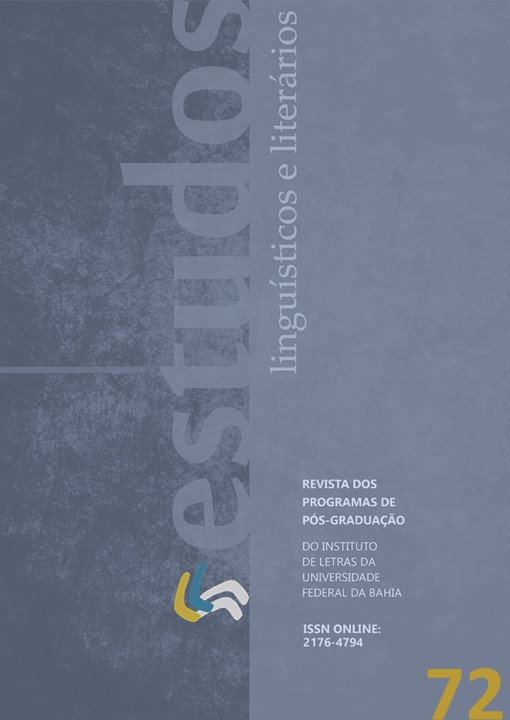GRAMMATICAL GENDER MARKING ON NEW FORMATIONS IN BRAZILIAN PORTUGUESE
DOI:
https://doi.org/10.9771/ell.i72.45847Keywords:
Grammatical Gender, Gender Assignment, Loanwords, Pseudowords, MorphophonologyAbstract
This work investigates factors involved in the assignment of grammatical gender to new nouns in Brazilian Portuguese, assuming the role of speakers' internalized knowledge concerning rules and patterns of the native language. We analyzed loanwords borrowed from English to Portuguese, as well as data from an experiment where speakers had to assign gender to pseudowords. The results show that, in the case of English loanwords, semantic analogy prevails as a criterion for gender assignment, due to the phonotactics of English, which inhibits phonological endings associated to gender in Portuguese. Among pseudowords, formal criteria appeared as relevant, where endings related to feminine have been assigned feminine in the tests. Results suggest systemacity in the assignment of gender to new words, where constraints of different natures interact.
Downloads
References
ALCÂNTARA, C. As classes formais do português brasileiro. Letras de Hoje, Porto Alegre, v. 45, n. 1, p. 5–15, 2010.
ARMELIN, P. Classifying nominals in Brazilian Portuguese: a unified account for gender and inflectional class. In: VESELOVSKÁ, L.; JANEBOVÁ, M. (orgs.). Complex visibles out there: Proceedings of the Olomouc Linguistics Colloquium 2014: Language Use and Linguistic Structure. Olomouc: Palacký University, 2014, p. 67-82.
CÂMARA JR., J. M. Estrutura da língua portuguesa. 42. ed. Petrópolis, RJ: Vozes, 1970.
CANO, W. M.; PRADO, D. de F. Os estrangeirismos da área da informática no Aurélio XXI. Revista Alfa, São Paulo, v. 50, n. 2, p. 265–275, 2006,
CORBETT, G. Gender. Cambridge: Cambridge University Press, 1991.
HALLE, M.; MARANTZ, A. Distributed Morphology and the Pieces of Inflection. In HALE, Kenneth; KEYSER (Eds.). The View from Building 20. Cambridge: MIT Press, 1993, p. 111-176.
______. Some key features of Distributed Morphology. MIT Working Papers in Linguistics, v. 21: Papers on phonology and morphology, p. 275-288, 1994.
HARRIS, J. W. The exponence of gender in Spanish. Linguistic Inquiry, v. 22, n. 1, p. 27-62, 1991.
HASPELMATH, M. Lexical borrowing: Concepts and issues. In: HASPELMATH, M.; TADMOR, U. (Eds.). Loanwords in the world's languages: a comparative handbook. Berlin: Mouton de Gruyter, 2009. p. 35–54.
HAUGEN, E. Bilingualism in the Americas: a bibliography and research guide. Tuscaloosa: American Dialect Society, 1956.
MCCARTHY, J. J. Hidden generalizations: phonological opacity in Optimality Theory. London: Equinox, 2007.
______. Pausal phonology and morpheme realization. In: BOROWSKY, Tony; KAWAHARA, Shigeto; SHINYA, Takahito; SUGAHARA, Mariko. Prosody Matters: Essays in Honor of Lisa Selkirk. London: Equinox, 2011.
ORSI, V. A presença de empréstimos da língua inglesa na revista brasileira Glamour. In: Colóquio de Moda: 8ª Edição Internacional, 11., 2015, Curitiba. Anais eletrônicos [...]. Curitiba:2015.Disponívelem:http://www.coloquiomoda.com.br/anais/Coloquio%20de%20Moda%20-%202015/COMUNICACAO-ORAL/CO-EIXO4-COMUNICACAO/CO-4-A-PRESENCA-DE-EMPRESTIMOS-DA-LINGUA-INGLESA-NA.pdf. Acesso em: 17 jun. 2018.
POPLACK, S.; POUSADA, A; SANKOFF, D. Competing influences on gender assignment: variable process, stable outcome. Lingua, v. 57, p. 1–28, 1982.
ROCHA, L. C. Estruturas morfológicas do português. Belo Horizonte: Ed. da UFMG, 1998.
SANKOFF. G. Linguistic outcomes of language contact. In TRUDGILL, P., CHAMBERS, J.; SHILLING-ESTES, N. (Eds.). Handbook of sociolinguistics. Oxford: Basil Blackwell, 2001, p. 638-668.
SCHWINDT, L. C. Zeros na morfologia nominal portuguesa à luz da Optimal Interleaving Theory. Revista virtual de estudos da linguagem – ReVEL, n. 5, v. especial, p. 264-276, 2011.
______. Exponência de gênero e classe temática em português brasileiro. D.E.L.T.A., v. 34, n. 2, p. 745–768, 2018.
______. Predizibilidade da marcação de gênero em substantivos no português brasileiro. In: Danniel CARVALHO, D.; BRITO, D. (orgs.). Gênero e língua(gem): formas e usos. Salvador: Editora da UFBA, 2020, p. 279-294.
SURREAUX, P. A atribuição de gênero gramatical a itens novos em português brasileiro. 2020. Trabalho de conclusão de graduação (Graduação) - Universidade Federal do Rio Grande do Sul. Instituto de Letras, Porto Alegre.
THORNTON, A. M. Constraining gender assignment rules. Language Sciences, v. 31, n. 1, p. 14–32, 2009.
VALADARES, F. B. Uso de estrangeirismos no Português Brasileiro: variação e mudança linguística. 2014. Tese (Doutorado em Letras). Pontifícia Universidade Católica de São Paulo/PUCSP, São Paulo.
WOLF, M. A. Optimal Interleaving: serial phonology-morphology interaction in a constraint-based model. 2008. Doctoral Dissertation. University of Massachusets Amherst. ROA-996.


